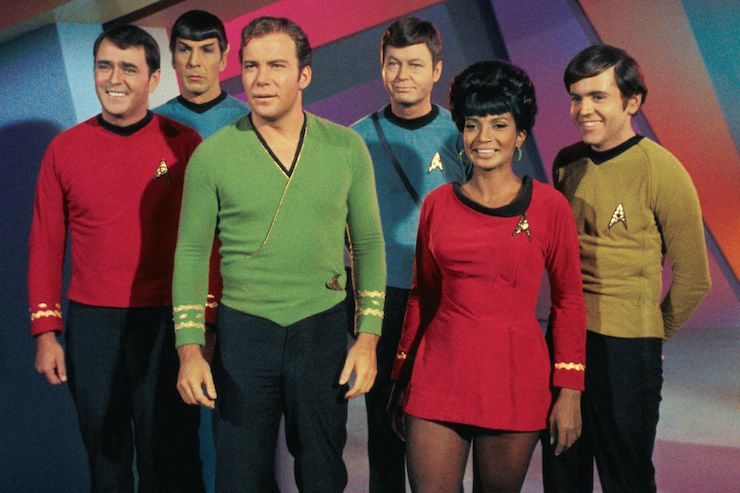“Infinite diversity in infinite combinations.” That is one of Star Trek’s most prominent mottos (even if it was ultimately created out of a desire to sell merchandise). That is what the spirit of Trek is meant to embody. The wonder of the universe wrapped up in a statement of inspiration and acceptance, a promise to pursue that which we do not understand; to embrace it with optimism and open minds.
They are captivating words that Star Trek has worked hard to advocate, with varying results. But if Trek intends to be relevant long into the 21st century, those words could use re-examination. Showrunner Bryan Fuller has promised a return to this idea, this motto, in his new show Star Trek: Discovery, and some vague (but heartening) promises have been made in that direction. Still, the question stands: in this day and age, how can Star Trek renew its commitment to infinite diversity? What should this bright, shining future show us fifty years after its inception?
Star Trek been held up as an example to aspire towards since its creation. The performers, writers, producers, and directors involved have long understood the impact of what they were helping to build. Actors to astronauts have cited Trek as the reason that they believed there were no limits to what they could achieve. It is a legacy that Star Trek fans are rightly proud to be a part of.
But Star Trek hasn’t always been a perfect embodiment of these ideals. Though it was quite progressive for its initial audience fifty years previous, the Original Series is painfully tame by current standards. That’s down to the passage of time—what seemed progressive in 1966 was old hat during Trek’s resurgence in the 1990s, and in turn what seemed progressive then is behind what seems forward-thinking now—but there are many areas where Trek never quite bothered to push the envelope. Up until the present moment, certain topics have been seemingly off-limits on Star Trek: discussions of human faith, of gender and sexuality, of deeply rooted prejudices that we are still working through every single day as a species, and more.
If Star Trek wants to continue its mission to elevate us, to showcase the best of our humanity and what we can achieve, it needs to be prepared to push more boundaries, to further challenge assumptions, to make people uncomfortable. And doing so in an era where viewers can instantly—and loudly—share their opinions will undoubtedly make that even harder than it used to be. But without a willingness to be a part of the present-day cultural conversation, Star Trek loses its relevance, and its legacy stops here.
There’s a lot left for Star Trek to explore, so where can the series go in its next 50 years? Here are just a few ideas to keep in mind.
LGBT+ is More Than Just the LGB
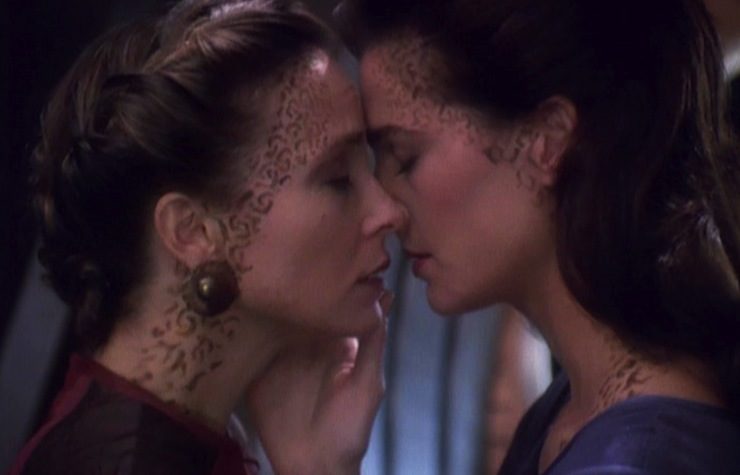
Bryan Fuller has already enthusiastically stated that Discovery will have a gay crew member. This excited many fans who have been pushing for better queer representation in Trek for decades, and is undoubtedly exciting for Fuller as well; when he made the announcement, he added that he still has a folder full of hate mail that the writers received during the run of Star Trek: Voyager, when rumors spread that Seven of Nine was going to be a lesbian. As a gay man, it is understandable that Fuller is eager to have final word in the argument of whether or not Trek’s future has a place for queer people.
Problem is, western culture has moved beyond that question in the past couple of decades. Gay, lesbian, and bisexual characters are a consistent part of mainstream entertainment now (especially in television), and have been visible in that arena for quite a while; a fact that Fuller himself is aware of, as he cited Will and Grace as the point of “sea change.” Helmsman Hikaru Sulu was depicted as a gay (or possibly bi) man with a family in Star Trek: Beyond. Granted, it’s true that despite the headway, queer characters are frequently mistreated in fiction, mired in stereotypes and then murdered just for daring to exist. But it doesn’t change the fact that, at this point in time and after such a storied history, having a gay crew member on the Discovery is the absolute least that Star Trek could do. It’s the bare minimum, a temporary patch on something that should have been fixed long ago.
What about the rest of that alphabet? Where are the asexuals in Trek? The trans and non-binary folks? Intersex people? What about the people who practice polyamory? Sure, we had Doctor Phlox on Enterprise, but he was an alien whose entire species practiced polyamory, thereby preventing any exploration of an example on the human front. (Having Phlox encounter a human who also practiced polyamory would have been a fascinating opportunity to compare and contrast, and would have also prevented polyamory from being put down to “an alien thing.”) Moreover, we never encounter his culture in any meaningful way to see how that polyamory functions in practice. So how do we examine and internalize these differences? If the answer is “well that was handled in one episode on TNG via another species”, that answer is not good enough anymore. These groups are full of people being maligned and ignored, and for many of them, that ignorance is costing lives. Having a gay crew member in Discovery will be wonderful, but there are still so many people who deserve to be represented in the future Trek creates.
Disabilities Don’t Need to Be “Cured”
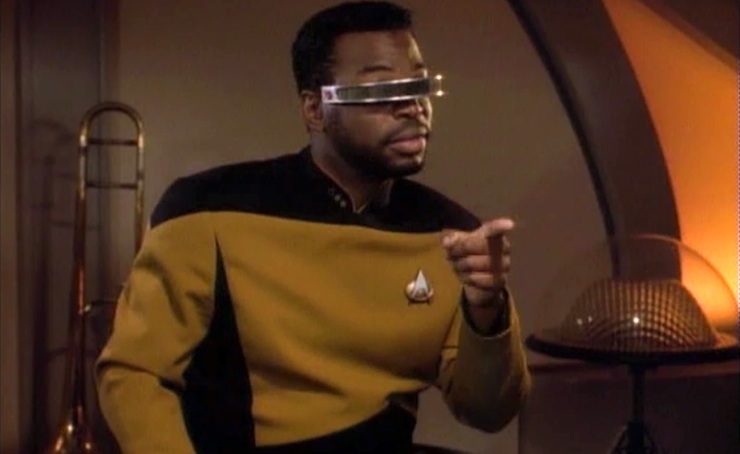
Seeing Geordi LaForge on Star Trek: The Next Generation was a big deal over twenty years ago. Trek had depicted blindness before on the Original Series (in the episode “Is There in Truth No Beauty?”) but having a main character in a television series with such a clear disability was just as rare then as it is today. What’s more, Geordi was never defined solely by that disability, and had one of the most important jobs on the Enterprise (D and E!). All of these things were groundbreaking. The only thing was, due to his VISOR, Geordi could effectively see (in some ways even better than your average human).
To a certain extent, this makes sense. Star Trek occurs in the future, and medicine has leapt ahead by centuries. Its limits are defined by technology and morality rather than economy. More to the point, even now doctors and scientists are coming up with ways to fix issues in ways that were once unthinkable, transplanting organs, limbs, and even faces, and making rapid progress in creating controllable and flexible artificial limbs. (Perhaps it would make more sense to see Starfleet officers who look like the Borg, with cybernetic implants and robotic limbs aplenty.)
But as some diseases are cured, new ones always arise. And Trek has a strange track record in that regard, as it often runs the gamut between extremes when it comes to health and wellness; either you have a problem that can be easily amended with the use of tech and/or the right medicine, or you have a debilitating disease that is going to kill you. There is very little in-between. As a result, we find few characters living with disabilities in Trek. And the exceptions—such as Melora in her eponymous DS9 episode—frequently leave something to be desired, as they rely on the “medical model” of disability; meaning the idea of disability as something that should be solved or cured. Not only is this unhelpful in a broader sense, but it ignores the value of disabled lives by making it seem as though people who have disabilities are inherently missing out because they are not traditionally able-bodied.
If Star Trek were to key into the “social model” of handling disability, then we would see people with various disabilities—both mental and physical ones—working side by side with non-disabled friends and shipmates. Accessibility would be built into starship design, considerations made in prepping for away missions, text rendered in different fonts for officers with dyslexia, and so forth. We would see people with disabilities simply living their lives, and take that concept to heart going forward.
Focus On Current Issues
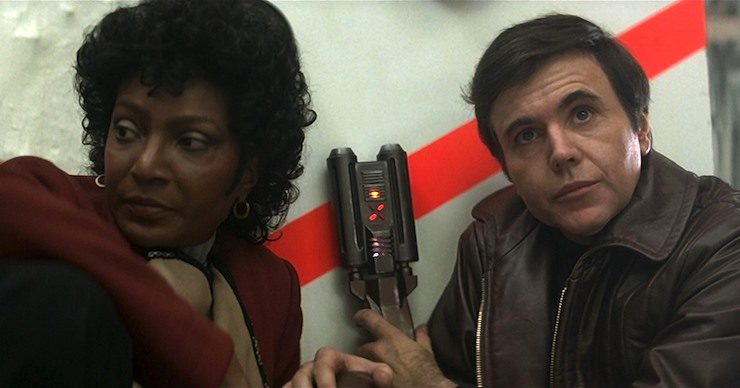
This is basically a given, but as Star Trek was a response to the politics and issues of its time, new incarnations must look to the current landscape and comment on the problems we now face. Nichelle Nichols has famously told and retold the story of Dr. Martin Luther King Jr. asking her not to leave the role of Uhura midway through Star Trek’s original series run, due to how important her presence was in the midst of the Civil Rights Movement. Having Pavel Chekov on the bridge during the Cold War was a deliberate move on Gene Roddenberry’s part to suggest that peace would triumph. The Cardassian occupation of Bajor detailed in DS9 brought issues of terrorism and the lives of refugees to the fore at a time when the Oslo Accords had just been signed. Star Trek has always looked to the here and now, and used our current conflicts as an example to promote hope rather than fear.
Nicholas Meyer thankfully gave confirmation of that same intent during the Star Trek: Discovery panel at Mission New York, saying that commentating on present events is built into Star Trek (and then citing how the end of the Cold War was a springboard for the plot of Star Trek VI). Given the wealth of social, political, and environmental strife in the world, it shouldn’t prove any difficulty to find material for a Star Trek series today.
Complexities of Faith
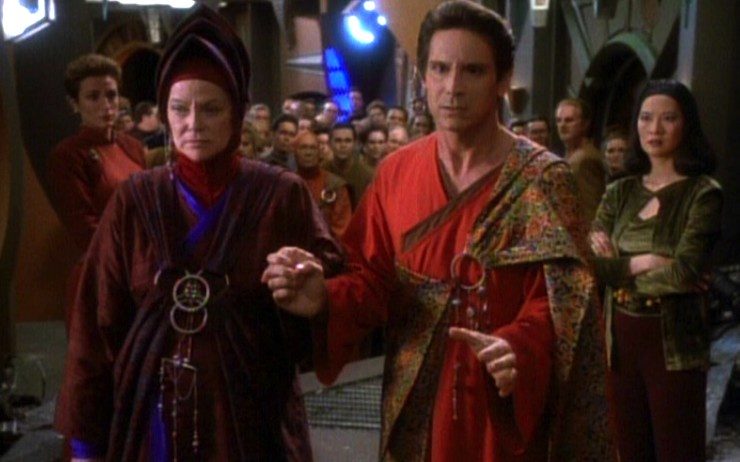
Star Trek has worked hard over the years to offer detailed and fascinating faith systems for many of the aliens encountered by the franchise, including the Klingons and the Bajorans. But when it comes to humanity… there’s an odd absence. Some of this comes down to creator Gene Roddenberry being an avid atheist—he explicitly prevented stories about religion from being told while he was running the show, and whenever the Original Series encountered gods, they inevitably proved to be false. To whit, there’s an infamous treatment for the Star Trek motion picture where Roddenberry had Captain Kirk fighting Jesus.
But faith, in one form or another, is a long-standing part of humanity, in many ways irrevocably intertwined with culture. While some aspects of religion have divided humanity over time, faith can be truly beautiful and uplifting, and is needed by many as a source of comfort and community. And at a point in time where religions themselves often get demonized in place of the radical groups purporting to endorse them, showing these faiths alive and well in Star Trek would be a remarkable gesture. Religion is still often a cause for conflict among humans, but here there lies an opportunity to show how faith can create connections between people, and perhaps create dialogues between humanity and other alien races. Showing characters who live so far in the future engaging with faith in the interest of exploration and friendship is an example that humanity could use.
Faith as a construct is arguably as central to humanity as aspects that we cannot control, such as sexuality or ethnicity, and does not always apply to us in a religious sense; faith informs a large part of our various worldviews, regardless of whether or not it is attached to a deity or system. Without an acknowledgement of that, Trek’s vision of human beings is incomplete.
Handling All Forms of Prejudice
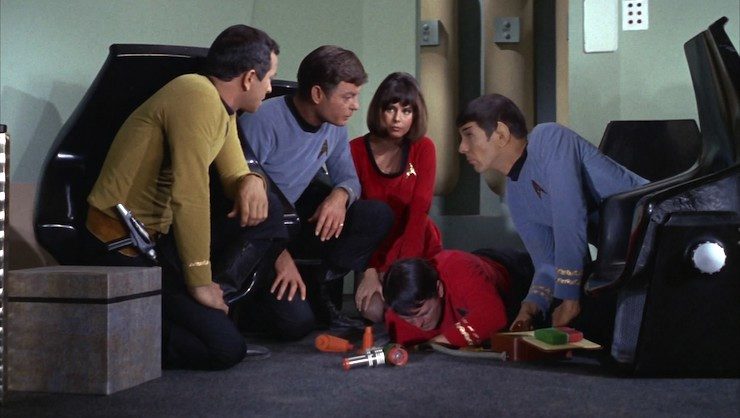
The initial concept of Star Trek was meant to show (during the height of the Cold War, no less) that humanity would not disappear in a nuclear winter. We would survive, learn from our mistakes, thrive, and work together toward a better future. When Star Trek tackled themes of prejudice, it typically used an alien scapegoat rather than a human one—the xenophobic terrorist organization Terra Prime, Picard’s fear of the Borg after his experience being assimilated, or the ways in which members of various Enterprise crews showed disdain and bigotry toward Spock and T’Pol. The idea was to suggest that humanity had gotten past the issue of internalized prejudice where its own species was concerned, yet still directed that impulse outward from time to time.
But by acknowledging that those prejudices still exist—even if they are focused primarily on Vulcans or Klingons—it becomes impossible to suggest that humans won’t ever aim those prejudices at other humans again. The spirit of Star Trek is not about humanity advancing to the point of perfection, it is about us striving for a better ideal. Which means that Trek must continue to show people making mistakes on account of internalized biases and learning from those mistakes. The utopian leanings of Star Trek are not due to a lack of conflict—they are due to people being enlightened enough to own up to their own shortcomings, to consider other perspectives, to work harder in the future.
All of this means that Trek must continue to acknowledge and display prejudice, between humans as well as alien cultures, and then set the bar when it comes to handling that conflict and moving past it. This was something that Deep Space Nine excelled at in particular, but doing the same on a Starfleet vessel will create a different atmosphere. The chance to explore the true difficulties of existing side-by-side on a starship with several hundred of the same faces for years on end will receive the consideration it deserves.
With all this in mind, where does that leave Star Trek’s luminary future? With us.
Star Trek is optimistic at its core, and loves to ruminate on what makes humanity so wonderful, often presenting us with a myriad of examples that other characters are meant to take to heart—Spock, Data, and Seven were constantly learning about what made humans unique and formidable as a species. And the answer Trek gives us is typically: we’re incredible because we’re imperfect. We are passionate, we blunder through, we are messy. It’s a good lesson to be sure, and a comforting take on human nature.
But what if there is more to us than that?
“Infinite diversity in infinite combinations.” These words are a cornerstone of Vulcan philosophy, but they are pointedly an apt description of the entire human race. The spirit of Star Trek is exploration, and the universe it resides in posits that humans will be the natural ambassadors of the Federation’s message of unity and discovery. That we are poised to enter the galaxy with our arms outstretched, and that others will want to join us. Based on what, though? Our charm, our creativity, our business acumen? Let us hope not. Let us hope instead that it is because we are so intricate as a species—so infinitely diverse—that we are perfectly equipped to handle what’s out there. That is the bright future we’re looking for. A point somewhere in the not-too-distant future when we are so interested in understanding each other’s differences, in honoring and respecting one another, that it is only natural for us to extend that exploratory spirit outward.
Fifty years later, it’s the only ongoing mission that truly matters. And it’s one that Star Trek—with any luck—will always uphold.
Emmet Asher-Perrin is a staff writer with Tor.com. You can bug her on Twitter and Tumblr, and read more of her work here and elsewhere.










